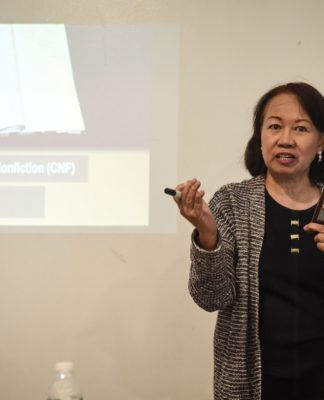 The Ophelia Alcantara Dimalanta that I met as an undergraduate in that small college that lives on in literary legend as “Philets” had a formidable reputation as a poet even then. Trying to describe it to me, a male classmate said: “Let’s put it this way, she’s UST’s answer to UP’s Virginia Moreno.”
The Ophelia Alcantara Dimalanta that I met as an undergraduate in that small college that lives on in literary legend as “Philets” had a formidable reputation as a poet even then. Trying to describe it to me, a male classmate said: “Let’s put it this way, she’s UST’s answer to UP’s Virginia Moreno.”
I had wonderful literary mentors in Philets, and all of them were women: Erlinda Francia Rustia, Piedad Guinto Rosales, Josephine Bass Serrano. The best of them all I met when I entered the graduate school, Dr. Carolina Garcia.
Ophie was not as dramatic and striking as Linda Rustia, or as quick and humorous as Pity Rosales, or as motherly and effusive as Josephine Serrano. She was quiet, low-key… even reclusive.
There were those who claimed that she was rather aloof when it came to her girl students, that she was warmer toward the men. Maybe it was this which made me initially indifferent to her. Also, one had strain to catch some of her words when she lectured on those difficult poets, Wallace Stevens or William Butler Yeats. Or Edith Sitwell. One’s attention wandered. She lacked the panache, the dash, the “dating” of our other women mentors. But unlike them all, Ophelia was herself a writer. And for me and my classmates who aspired to be writers ourselves, that made a world of difference.
Later, when I joined the faculty of what had become the College of Arts and Letters, Ophie and I would find ourselves sharing one of those long tables in the Artlets Faculty Room, and having long chats over merienda. (Not over lunch, as far as I can recall. Ophie’s classes were invariably in the afternoon classes or the evening—I don’t now remember why she preferred it that way.) Anyway, I would find her to be quite the opposite of the remote, elusive prima donna I had taken her to be. Ophie, I discovered, was surprisingly warm, given to sudden, spontaneous confidences, girlish, giggly even. Soon we had become good friends.
When I returned to the Philippines after 15 years of living abroad, and I began, timidly, to try to publish my new stories here, I felt very insecure. I had been away for too long. Even if I had published three books here while living overseas, I had no idea what people in my own country thought of them. In those days—before e-mail and the Net—an expatriate felt very cut off from her roots. Besides, I was experimenting with what for me was a new form—the modern tale.
Ophie did not wait for me to ask. She simply demanded: “O, ano, gusto mo bang sumulat ako ng introduction?” So my short story collection, For Whom the Moon Rages is one of the very few books of mine which has an introduction, and it is by Ophelia Alcantara Dimalanta.
But now I want to speak about another side to Ophie, a side I was to discover quite unexpectedly before I left the country in early 70s. I don’t know how many people know this side of her. I am referring to the fierceness of her loyalties, and the strength of character.
I have never spoken about this in public before. Perhaps now is the right time. There was a time when I found myself hounded by some persons who held what might be called positions of power, and who, for some reason I have not fathomed to this day, wanted me thrown out of the institution for which I was working. Only Ophie took my side. And when she found that she could do nothing to help me keep my position, she did her best to help me find a place elsewhere.
That was a long time ago, and we never spoke about it again, Ophie and I. But I hope she knows I have never forgotten that debt which I owe her,and can now never repay.
So, Ophie, I say this with deep affection and an abiding gratitude: maraming salamat. It was a privilege to have been both your student and your friend. You were what most of us aspire to be, but which not very many of us achieve: a gifted writer, a dedicated teacher, a loyal friend, and a true gentlewoman in the finest sense of the word.

















